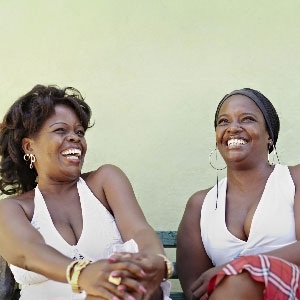
A small new study suggests that parts of your brain may differ depending on whether you're a social butterfly or a lone wolf.
The research is preliminary, but it could lead the way to more insight into how humans -- and other primates -- interact with others.
"The big message is that your brain is reflecting your current social environment, and your social skills at a wider level. The brain is flexible and reflecting all of these behaviours," said study author Maryann Noonan, a postdoctoral researcher at Oxford University, who worked on the study while at the Montreal Neurological Institute.
There's also the question of which comes first. Is the brain pre-programmed to turn certain people into more social creatures? Or does your brain change as a result of whether you're willing to engage with lots of other people in your life?
Social complexity and evolution
At issue is the connection between your brain and your ability to socialise with others of your species.
"There is a theory that social complexity drove the evolution of bigger brains in humans," said Paul Zak, chairman of the Center for Neuroeconomics Studies at Claremont Graduate University, who's familiar with the findings.
If that's the case, it may be possible that human brains are different depending on how social people are. That's what the authors of the new study tried to find out.
The researchers recruited 18 people, aged 27 to 70, and asked them about how many people they encountered over the past seven and 30 days. The researchers were trying to determine "social contact," according to Noonan: "Any phone call, any physical interaction, any email."
The researchers also scanned the brains of the 18 people and looked for anything that people with similar social lives had in common. They discovered that three parts of the brain appeared to be larger and more strongly connected to other regions of the brain in people who had larger social networks, Noonan said.
The findings reflect previous research that found similarities in the brains of monkeys who lived in larger groups. "This is telling, and perhaps could show some sort of common mechanism across primates," she noted.
Noonan suspects -- but can't yet prove -- that it's the brain that adjusts to how social people are. "While I have to hedge my bets, I think the brain is able to adapt to all of your current skills and needs," she explained. "But we're not able to make the claim that it's getting bigger or better connected."
Lonely people have brain differences
Zak, the neuroeconomist, said it is indeed hard to figure out which comes first -- better social skills or certain types of brains. However, "their findings are consistent with studies showing that lonely people have differences in brain volume than non-lonely people," he said.
Noonan said the next step is to better understand which areas of the brain are crucial to being social.
In the big picture, though, it may be difficult to understand what's going on because it will be hard to design a study that follows people from a young age and specifically determines how their brains affect their social lives, Zak said. "We are unlikely to have a definitive answer as to how our innate brain structure affects our behavior," he added.
Still, study lead author Noonan said this kind of research can lead to better understanding of how conditions like autism and schizophrenia disrupt people's abilities to be social in a normal way.
More information
People who have trouble socializing with others may suffer from a psychiatric disorder. For more about mental illness, visit the U.S. National Library of Medicine.




 Publications
Publications
 Partners
Partners














